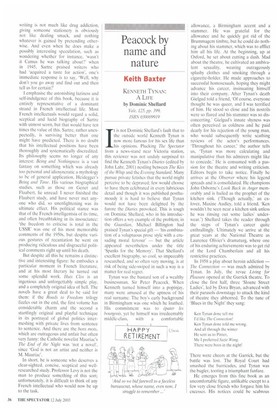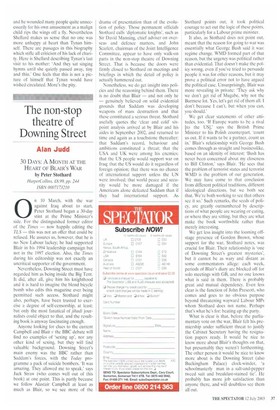Peacock by name and nature
Keith Baxter
KENNETH TYNAN:
A LIFE by Dominic Shellard Yale. £25, pp. 399, ISBN 030009919 1 t is not Dominic Shellard's fault that to the outside world Kenneth Tynan is now more famous for his sex life than his opinions. Plucking The Spectator from a news-stand near Victoria station, this reviewer was not unduly surprised to find the Kenneth Tynan's Diaries (edited by John Lahr, 2001) nestling between The Kiss of the Whip and the Evening Standard. Many pursue private fetishes that the world might perceive to be depraved; few would choose to have them celebrated in every lubricious detail and though it was published posthumously it is hard to believe that Tynan would not have been delighted by the furore the Diaries provoked. This is tough on Dominic Shellard, who in his introduction offers a wry example of the problem; in the Guardian. Michael Billington had praised Tynan's special gift — 'his combination of a voluptuous prose style with a crusading moral fervour' — but the article appeared nevertheless under the title 'Spanks for the Memory'. That Shellard's excellent biography, so cool, so impeccably researched, and so often very moving, is at risk of being side-swiped in such a way is a matter for real regret.
Tynan was the bastard son of a wealthy businessman. Sir Peter Peacock. When Kenneth turned himself into a popinjay, many were amused at the aptness of his real surname. The boy's early background in Birmingham was one which he loathed. His commitment was to epater les boutgeois, yet he himself was irredeemably middle-class, with a comfortable
allowance, a Birmingham accent and a stammer. He was grateful for the allowance and he quickly got rid of the Brummagem timbre, but he could do nothing about his stammer, which was to afflict him all his life. At the beginning, up at Oxford, he set about cutting a dash. Mad about the theatre, he cultivated an ambivalent sexuality, wearing outrageously splashy clothes and smoking through a cigarette-holder. He made approaches to successful homosexuals, hoping they might advance his career, insinuating himself into their company. After Tynan's death Gielgud told a friend, Of course, everyone thought he was queer, and I was terrified of him. He stood so close and his nostrils were so flared and his stammer was so disconcerting.' Gielgud's innate shyness was often perceived as coldness and he paid dearly for his rejection of the young man, who would subsequently write scathing reviews of the actor's performances. 'Throughout his career,' the author tells us, 'Tynan was more calculating and manipulative than his admirers might like to concede.' He is consumed with a passion for the theatre and writing criticism. Editors begin to take notice. Finally he arrives at the Observer where his legend spreads and is consolidated. He champions John Osborne's Look Back in Anger memorably and is hailed as the prophet of the kitchen sink. (`Though actually,' an exlover, Maxine Audley, told a friend, 'Ken wouldn't be seen near a kitchen sink unless he was rinsing out some ladies' underwear.') Shellard takes the reader through the steps of Tynan's career quite enthrallingly. Ultimately we arrive at the great years at the National Theatre as Laurence Olivier's dramaturg, where one of his enduring achievements was to get rid of the Lord Chamberlain and all his restrictive practices.
In 1958 a play about heroin addiction — The Connection — was much admired by Tynan. In July, the revue Living for Pleasure opened at the Garrick theatre. To close the first half, three 'Sloane Street Ladies', led by Dora Bryan, advanced with their parasols downstage to attack the kind of theatre they abhorred. To the tune of 'Blues in the Night' they sang:
Ken Tynan done tell me I'd like The Connection!
Ken Tynan done told me wrong.
And all through the winter He sent us to Pinter,
Me I preferred Suzie Wong.
There were boos in the night!
There were cheers at the Garrick, but the battle was lost. The Royal Court had smashed the barricades, and Tynan was the bugler, tooting a triumphant fanfare.
He emerges from this fine book as an uncomfortable figure, unlikable except to a few very close friends who forgave him his excesses. His notices could be scabrous and he wounded many people quite unnecessarily for his own amusement as a malign child rips the wings off a fly. Nevertheless SheHard makes us sense that no one was more unhappy at heart than Tynan himself. There are passages in this biography which stifle all criticism of his lack of charity. Here is She'larcl describing Tynan's last visit to his mother: And they sat singing hymns until she quietly passed away, tiny and thin.' One feels that this is not a picture of himself that Tynan would have wished circulated. More's the pity.



































































 Previous page
Previous page